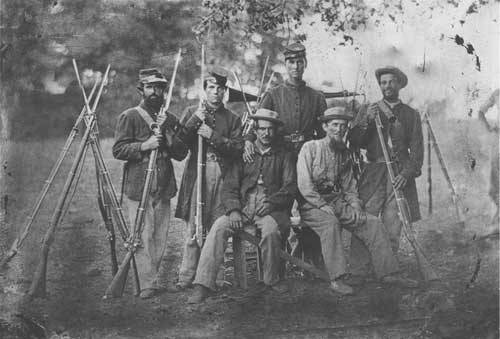peashooter85: How Britain Armed the Confederacy,After the the First Battle of Bull Run/ Manassas, Br
peashooter85: How Britain Armed the Confederacy,After the the First Battle of Bull Run/ Manassas, British military observers did a survey of Confederate small arms. The survey found that 75% of Confederate military musket were smoothbores. Smoothebore muskets do not nearly have the range or accuracy of rifled muskets, which in America was considered a new technology. At the same time the Union Army was likely armed with many old smoothbores, most of which were left over from the Mexican American War or older. However, after the first battles of the war, Northern industry went into full force and it was not long before the Union Army was almost completely equipped with rifled muskets, not to mention cannon, ships, and other arms or supplies. The Confederacy, on it’s own, was woefully short of arms. Most Confederate weapons early in the war were leftovers stored in armories. With the South’s lack of industry, there was little native arms production and the Confederacy could not hope to compete with Union production. A good example would be the Richmond Arsenal, the Confederacy’s largest arms production factory, which produced around 30,000 rifled muskets during the entire war. By comparison, the Union Springfield Armory was producing the same amount on a monthly basis, and the US Government subcontracted scores of other private firms which manufactured millions of rifles, carbines, and pistols. At the beginning of the war, the Confederate artillery had cannon which numbered in the hundreds, most of which were old an outdated, northern foundries began manufacturing cannon by the thousands. So this begs the question, why didn’t the Union simply steamroll the Confederacy, which was completely out-manned and outgunned? Confederate generals are noted as legendary tacticians, and Union generals in the early war have a reputation as morons, but tactics only go so far when your enemy is armed with a seemingly endless supply of weapons which are a generation ahead of yours in terms of technology, and your side doesn’t even have enough obsolete weapons to arm your own men, nor the infrastructure and resources to produce more. The answer was that the Confederates received arms from foreign powers, most notably Britain. During the war Britain was officially neutral, unofficially Britain was the number one backer of the Confederacy in terms of supplying armaments. While the British government was officially neutral, it turned a blind eye to private British firms who made a killing selling arms to the Confederacy. The most numerous export to the Confederacy was the British P-53 Enfield musket, a rifled musket that was the primary infantry arm of the British Army. These weapons were sometimes military surplus from the Crimean War, bought at a discount and sold cheap to Confederate agents. Many were also newly manufactured and sold to wealthy British businessmen who exported them to America. The muskets were shipped by British ships to Bermuda or British held colonies in the Caribbean, then transferred to Confederate agents to be smuggled into the states. From there, they were either smuggled directly to the South by blockade runners which raced past Union blockade ships, were shipped to Mexican ports where they would be smuggled across the Texas border, or shipped to Northern ports where they would secretly make their way through Union territory into the Confederacy.The supply of Enfield muskets to the Confederacy was profound. Around 500,000 were imported by the Confederacy, and it became the most heavily used musket of the Confederate Army. By mid war, British military advisers did another survey of Confederate small arms which showed that 75% were rifled muskets, due of course in no small part to Enfield musket imports. Muskets were not the only war materials supplied by Britain to the Confederacy. Other weapons included artillery, ammunition, ships, as well as uniforms, medical supplies, foodstuffs, and other important war materials. Supplying ships to the Confederate Navy was an especially big payoff, as these ships were used as commerce raiders which attacked Union merchant shipping. While Confederate merchant raiding barely put a dent in Union merchant shipping, it drove up insurance rates so high that most businesses preferred to use cheaper British shipping. At the time, US commercial shipping was at point that it was beginning to challenge Britain’s monopoly over the global shipping industry. However the Civil War ensured that British shipping would remain dominant until World War I.It should be noted that Britain was not the only foreign backer of the Confederacy. France sold artillery, muskets, and ironclad warships to the South, albeit to a much lesser extent, while the Austrian Empire sold Lorenz muskets to both sides. It should also be noted that British sales and support for the Confederacy was not entirely politically motivated. While British arms dealers sold 500,000 Enfield muskets to the Confederacy, making it the most used weapon of the Confederate Army, British firms also sold 400,000 Enfield muskets to the Union, making it the second most used weapon in the Union Army. Selling weapons to both side is just good business. Overall, the British Empire manufactured 1.5 million P-53 Enfield muskets, with 900,000 being exported to America. Weird that a classic British rifle would see more use by Yanks and Rebs, than by Brits. -- source link

